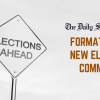Managing expectations the challenge for EC

A new Election Commission has taken office amid a novel set of challenges. Besides the typical challenge of building trust and credibility, the Nasir Uddin commission is also burdened with high expectations following the mass uprising of July and August.
Typically, the immediate challenge of the top election office is to create a pathway to free, fair, inclusive and credible national elections as well as local elections (city corporations, sub-districts councils and union councils).
But this time, local elections perceptibly have far less import than alignment with the people's aspirations. This will also include creation of such a pathway that facilitates a peaceful transition following those elections. It is also for this reason that establishing the credibility of the next elections is absolutely imperative.
One of the reasons behind people taking to the streets was that the Hasina-led government deprived citizens from their right to vote since 2008. This naturally eroded people's trust in the neutrality and independence of the Election Commission, which was a mere rubber stamp to legalise Awami League's usurpation of power in last three elections of 2014, 2018 and 2024.
The 2014 election was not just one-sided. It saw 153 MPs elected to the 300-seat parliament unopposed. In the 2018 elections, there were numerous reports of ballot-box stuffing on the eve of the elections while the 2024 election saw a string of dummy candidates by the ruling party to bolster the number of contestants to make it seem like an authentic election.
The BNP and other major opposition parties boycotted the elections in 2014 and 2024, and while they participated in 2018, their efforts were undermined by widespread suppression from the ruling party.
Restoring public confidence in the electoral system is a complex task and that requires substantial time, a luxury that the new Election Commission will not have given the growing impatience for an election.
That should be evident from the questions this commission will be asked—not only from political parties but also from the public—about when the next elections will be held. The underlying presumption for this keen interest in the next polls is that after a long time, this one will be fair and inclusive, the responsibility of which rests squarely on the shoulders of the new commission.
The EC typically prepares its roadmap for national elections in line with the constitutional provisions requiring elections to be held within 90 days of the parliament's expiry. However, this time it is different since there is no parliament in place.
The commissions, which held the 2014 and 2024 elections, faced heavy criticism for their failure to hold inclusive elections. Only 12 political parties participated in 2014, while 28 parties took part in 2024.
Whether the next elections will be inclusive remains uncertain. The future of the Awami League and its alliance partners, as well as the "designated" opposition Jatiya Party, remains unclear.
The interim government has formed an Electoral Reform Commission, which will presumably help with rebuilding trust through its proposed reforms. So far, these include introduction a proportional representation system (in place of the existing first-past-the-post system), a bicameral legislature, direct elections for reserved seats of women, and increasing the number of constituencies. These proposals will require constitutional and legal amendments.
The EC traditionally undertakes key tasks like updating election laws, redrawing constituencies, and preparing voter lists.
However, previous amendments have weakened its authority. For instance, the 2023 amendment restricted the EC's ability to postpone elections on the polling day only. Previously, the EC could postpone elections at any stage after announcing the schedule.
The EC's powers are now limited to merely recommending actions against misconduct, corruption and irregularities of its own officials but no authority to act against them, which many think is essential for fairness of elections.
Additionally, the EC does not currently have effective mechanisms to monitor whether candidates comply with campaign spending limits, a significant challenge it must address.
Constituency delimitation has also been contentious. Only 10 constituencies were redrawn before the 2024 elections, and 25 before the 2018 elections.
In both cases, the EC by and large ignored international guidelines stipulating that the variation in voter numbers between constituencies should be around five percent. Now some constituencies have more than 800,000 voters, while others have as few as 300,000.
One of the strong challenges the EC always faces is having full authority over police and administrative bodies during the election process right from when the schedule is announced until the publication of results in the official gazette.
This time the EC's challenge has increased as most of the police force are demotivated and a majority of the field level officials are new appointments.
Together, these issues mean that the pathway towards the next elections are fraught with steep challenges for the new commission. AMM Nasir Uddin and his commissioners will have to be sincere and diligent as well as resourceful and innovative — a tall order.

 For all latest news, follow The Daily Star's Google News channel.
For all latest news, follow The Daily Star's Google News channel. 







Comments